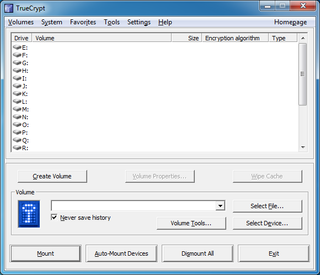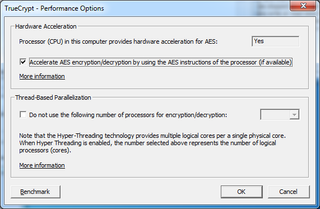Protect Your Data! TrueCrypt 7.0a's Performance, Analyzed
Version 7.0a of TrueCrypt offers many new features, including hardware-accelerated AES encryption via processors that support the technology. We discuss the new features and look at the performance impact of running an encrypted system partition.
TrueCrypt 7.0a: Features And Innovations
TrueCrypt is not limited to encrypting folders or individual files (unlike archiving programs, such as WinZip), but it can also encrypt entire partitions, hard disks, or USB thumb drives. This can be done in real-time too, allowing users to run a Windows configuration that is fully encrypted. TrueCrypt is only noticeable just before loading the operating system, when it asks for authentication. The real-time encryption still allows for smooth and unrestricted interaction with other non-encrypted drives, ensuring efficient operation of the system. Hidden or unidentified drives are supported as well.

TrueCrypt uses several modern encryption algorithms, but its first and foremost is Advanced Encryption Standard (AES) with a key length of 256 bits (AES-256). The three other encryption algorithms, Serpent, Twofish, and Cascades, employ the same key length. When set to maximum safety, the software can even encrypt the data twice in a nested mode, pairing any of the encryption algorithms mentioned above.
TrueCrypt version 7.0a can be downloaded for Windows, Mac OS, and several Linux distributions. Compared to version 6.1 of the program that we tested before, the new version contains a number of bug fixes and improvements. For example, the Favorite Volumes Organizer lets you choose partitions to mount while booting Windows. Since Microsoft released an API for Windows Vista and Windows 7, the software can now encrypt hibernation and crash dump files as well. However, there is no API to allow this for Windows XP and Windows Server 2003, leaving some files still unprotected. The quick and easy solution, of course, is to upgrade.
Hardware-Accelerated AES Encryption
TrueCrypt version 7.0a now supports hardware acceleration when using AES encryption, finally catching it up to BitLocker, which offers this capability straight from the factory. TrueCrypt uses AES New Insctructions (AES-NI), supported by current Intel processors starting with the 32 nm CPUs based on the Clarkdale design, then the 32 nm six-core Gulftown die, and most recently Intel's Sandy Bridge architecture. The aim is to accelerate encryption/decryption performance by a factor of four, eight, and even more in some cases. Note that the 45 nm quad-core Bloomfield design doesn't support AES-NI; neither does Lynnfield.
During installation, the software automatically detects if the computer is equipped with an AES-NI-compatible CPU and then activates the hardware acceleration by default.

We took the opportunity to evaluate TrueCrypt’s AES hardware acceleration performance, putting special emphasis on whether the AES encryption using the CPU instruction set actually is that much faster than the proven standard method.
Stay on the Cutting Edge
Join the experts who read Tom's Hardware for the inside track on enthusiast PC tech news — and have for over 25 years. We'll send breaking news and in-depth reviews of CPUs, GPUs, AI, maker hardware and more straight to your inbox.
We already determined that TrueCrypt encryption affects system performance during our review of version 6.1. But if you only use a single algorithm, you should not notice it much in everyday use. In theory, you should be able to run a system using double TrueCrypt encryption and not notice any performance drops, given the performance leap promised by hardware acceleration. How good is the speed-up in practice, then?
Current page: TrueCrypt 7.0a: Features And Innovations
Prev Page A Performance Check Using TrueCrypt 7.0a Next Page Test Hardware And Benchmarks-
eddieroolz I like the jab at Sony in the opening page!Reply
Anyhow. I've used TrueCrypt 7.0a for about a year now to secure my sensitive information. I've only encrypted a non-system partition as of now, but for the purpose of storing sensitive files the performance hit is unnoticeable. Took a bit of time to set up, but in the end, all worth it. -
kikireeki TrueCrypt is the best, but anyone who uses it should keep in mind that the data encrypted by it is not meant to be recoverable.Reply -
I encrypted my HP dm1z "netbook" system partition with Truecrypt. Even without AES-NI support by AMD E-350 the computer is still very responsive for non-gaming tasks. Thanks to Truecrypt for their great encryption utility and also to AMD for making a decent low-end APU.Reply
-
alidan a strong password and change it often...Reply
yea thats so not happening.
i could make my password look like that,
€‡“ŸeVmAE•kvÕbœ
but it would be REALY HARD to remember, and changeing it on a, lets say, monthly basis.... who are you kidding.
i have a 5 letter password
i have an 8 letter password
and i have a 6 letter password for when places force me to use a number, but at the same time, wont let me have 2 letters that are the same in a password.
i find it agonizingly annoying that i cant use a 5 letter password for everything, because i despise having more than 1. its my account, i will make it as secure as i want. i pay 10$ a month for id theft protection, is an account is lost because of "hacker" i tell someone about it and the account is dead to me.
i have only had 1 hacker in my life go for any one of my 100's of accounts (i mean 100's literally) and that is my gaia account that i made when gaia was new, and someone tried to brute force the account, 5 times back in 2008 (i have the emails in a special folder labeled F@$#ING BRUTEFORCER, without the censoring) and not a f@#$ was given by gaia (i didn't care, i stopped using it years before, i just informed them that some a$$hole was hacking my account to hopefully ban them, but they told me to p!SS off in almost those exact words). honestly security is overrated, yea id theft is bad, if you are parinoid, get protection and stop worrying, get a password that is 10 letters and number long, as no one is bruteforceing that, refuardless of where the account it, as long as they don't have your info or actually hacked the service. -
memadmax alidan,Reply
hackers use bruteforce as last resort as it takes so long.
Now they do the sneaky worm into your keyboard with a keylogger most times. Or if they are really targeting you, or want you bad, they will dig in your garbage....
Net Security 101...
-
sudeshc You want best encryption deal with the drawbacks as you find them or else write your own encryption logic.Reply -
alidan memadmaxalidan,hackers use bruteforce as last resort as it takes so long.Now they do the sneaky worm into your keyboard with a keylogger most times. Or if they are really targeting you, or want you bad, they will dig in your garbage....Net Security 101...Reply
not realy, what they do first and formost, is check any online foot mark you have. usualy your password is something you know, such as mothers maden name or a birthday. i use to use my birthday completely spelt out, but that is to long for MANY passwords, and, as you can see, my spelling is atrocious, so i spell it wrong 9 times out of 10.
but its my point exactly, they will get the info weather you want them to or not, and odds are, they will dumpser dive a hospital, dentist office, or doctors to get the info before they will ever go online.
-
Wamphryi I think that some may be missing the point about the benefits of encryption. For data on more portable media Truecrypt is most excellent. Also to be considered is that the data thief you should worry most about is not the Super Hacker on line but the opportunist thief who happens to steal your laptop. Your mail and photos etc in the hands of some petty thief?Reply
Most Popular

